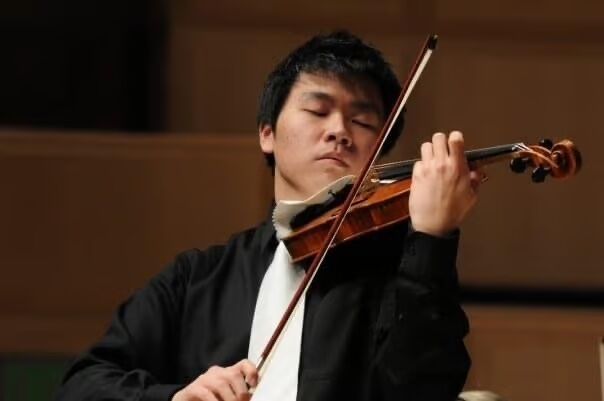Utah violinist’s deportation drama officially over

John Shin was detained for more than two weeks while working a side telecom job at Fort Carson
The deportation saga of Utah violinist John Shin, who was recently detained in Aurora for more than two weeks, ended quietly and happily for Shin and his family on Wednesday when the government essentially dropped its interest in his case.
“That means John is not in deportation proceedings anymore,” South Salt Lake attorney Adam Crayk told the Denver Gazette. “We won entirely. He’s out.”
Shin, a married father of two, was picked up by Department of Homeland Security agents in Colorado Springs on Aug. 20 and taken to the Denver Contract Detention Facility in Aurora, where he faced possible imminent deportation. It was his wife’s birthday back in Utah.
“I was in constant panic a little bit every night,” Shin said at a press conference. “I wasn’t sure what was going to happen tomorrow or the following day.”
Shin was given one phone call, he said, “and it was one of the worst moments in my life to hear my wife cry on her birthday.”
Shin, who was born in Korea, came to Utah as a child with his father – first on a tourist visa, then a student visa. He earned his master’s degree through the University of Utah Music Program while under DACA protections and was pursuing permanent legal status at the time of his arrest. That’s what brought him to Colorado Springs in August.
Shin, 37, married Denae Snow, a fellow musician and childhood friend in Utah, in 2021. That made Shin both stepfather to and provider for Snow’s two children, now 17 and 12. “With our marriage, we had every reason to believe that John deserves to be here,” she told the Denver Gazette.
Snow was laid off from her software job during the pandemic, and Shin’s performance opportunities similarly dried up. But the couple is required to maintain a financial threshold to support Shin’s bid for legal status through an I-130 visa. So Shin started taking side jobs in telecom. Shin was in Colorado Springs in August to do installs at the Fort Carson U.S. Army post when he was flagged while checking in. That’s because, back in 2019, shortly after his father had died of brain cancer, Shin was arrested for impaired driving.
At his initial court hearing in August, the government argued that Shin’s detention was justified by his impairment arrest, which they said invalidated his DACA protections. They said Shin has had six years since his arrest to obtain the green card made necessary by his arrest, and he hasn’t gotten it done. Crayk says there have been extenuating circumstances.
“His wife lost her job, John was having to put together piecemeal jobs, his father passed away of cancer, and they were in a little bit of financial disrepair,” Crayk said. But also, because of DACA, he added, Shin wasn’t on any kind of clock before the 2024 presidential election.
“Under the former administration, John was in no way, shape or form a priority for removal,” Crayk said.

Supporters from the human-rights and performing-arts communities held daily vigils during his detainment and rallied public support. Shin was released after 15 days on a $25,000 bond, which only meant that his deportation proceedings would shift to Utah.
Crayk immediately filed a petition to terminate the case entirely, which gave the government 30 days to appeal. That window ended Wednesday with no action taken.
That, Crayk said, means the government cannot now pursue deportation. He expects Shin to have his green card in about 16 months.
Why did the government give up the fight? Crayk said he believes it just wanted this particular immigration case to go away.
“I’m really glad that our government didn’t choose to fight this and didn’t waste valuable resources on somebody that is ultimately going to be a green-card holder and a citizen,” Crayk said.
Crayk said that while this ends Shin’s case, it’s far from over for tens of thousands of others. That’s because on Sept. 5, the Board of Immigration Appeals came out with a decision called The Matter of Yajure Hurtado.
“That decision says anybody who came across the border at any time, ever, regardless of having children who are born here, is mandatorily detainable without bond,” Crayk said. “So you could have lived here for 50 years, and now you’re subject to staying in jail for no matter what – and you can’t get out.”
Crayk is in the process of filing lawsuits questioning the constitutionality of that decision in at least three states.
“In the history of immigration law, this is probably the single worst decision I have ever seen since the Japanese internment camps,” he said.
“I’m glad it’s over for John Shin’s case. But there will be more.”
John Moore is the Denver Gazette’s Senior Arts Journalist. Email him at john.moore@denvergazette.com

















